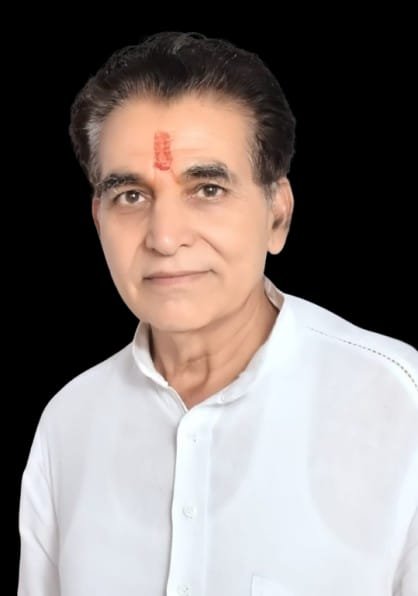Principal’s Desk

The search for the ultimate truth and the guru-shishya relationship associated with it have been the specialties of Indian culture since ancient times. There is a big difference between a guru and a teacher: after learning from a teacher, there may be a need to learn or know from someone else, but after learning from a guru, or after receiving the guru’s grace, nothing remains. There are many teachers in a person’s life, but there is usually only one guru.
The word "student" (छात्र) is made up of the Sanskrit words “chhatr” (छत्र) and “na” (ण), which are masculine nouns or adjectives. In ancient Indian tradition, the child was handed over to the guru (teacher) for education. In the order of service, these students used to hold a chhatr (छत्र) or an umbrella above the head of the guru (teacher). Those who walked behind their teacher or guru holding a chhatr (छत्र) or an umbrella came to be called students.
The student Is like a mirror In which the vision of the teacher’s self and nation is reflected. The relationship between teacher and student is like a mixture of milk and water; just as water mixed with milk is called milk, in the same way, the student of a virtuous teacher also becomes virtuous. The duty of the teacher is only to teach, but the responsibility of the student is not only to receive education with respect but also to spread that education and culture through his conduct in the family, society, and nation. This responsibility is also that of a teacher; therefore, a good teacher is also always a student. We call teaching the exchange of ideas or mutual interaction between the teacher and the learner by making a subject matter a medium.
Higher education is not only important for getting a livelihood, grooming it, and providing proper opportunities for it; it is also useful for getting great cultural experiences and more opportunities and possibilities in life.
In ancient times, education was known as Vidya. Vidya is derived from the root Vid, which means to know. Hence, Vidya means knowledge. Knowledge is the third eye of man. This eye helps in seeing the truth by removing ignorance. The literal meaning of education is also to get Vidya, that is, to acquire knowledge.
On getting higher education, the student can be oriented towards research. When a student full of wisdom, revealing new innovative meanings pervaded in words, moves forward, his intellect starts travelling towards doing new research in different areas of life.
Human civilization and culture improve by crossing various institutions of research. When a student enters any mode of higher education, after gaining understanding, he/she may be able to reach such a goal that is also achieved by any other mode. Education obtained through all modes makes a person valuable, capable, and the best citizen & civilized human being.
Being aware of this importance of higher education, parents should provide inspiration and opportunities for their children to move forward. Teachers should keep themselves daily enriched with new knowledge and be helpful in making the talents of the students outspoken and developed. The real challenge of a teacher is how he can make the students curious. Being curious is basically dependent on the students due to their free willpower, but a teacher can enlighten this element by making them aware of its importance and necessity through their conduct and scholarly guidance.
Along with being curious, it is necessary for the students to be physically healthy and hardworking. They have to have proper respect towards their teachers – “Shraddhavanlabhate Gyanam” (श्रद्धावान् लभते ज्ञानम्) only then we will be able to gain knowledge.
Students of university education should be equipped with a global vision. For him, the boundaries of the country are not bound. His knowledge is of public importance. When he says and writes something, the perspective of the statement remains in his mind.
In our Nehru Mahavidyalaya, established in July 1968, admission is taken in several courses conducted by Bundelkhand University, Jhansi. Presently, 5000 students are studying at this college. Under the National Education Policy 2020, BA, a three-year course in 10 subjects (Hindi, Sanskrit, English, Economics, Political Science, Physical Education, Sociology, Psychology, History, and Home Science); MA, in seven subjects (Economics, Hindi, Sanskrit, Psychology, History, Sociology, and Home Science); M.Sc. in Agricultural Chemistry and Soil Science; and B.Sc. (Agriculture), a four-year semester course; and, under the National Education Policy, B.Sc. (Maths & Bio), and B.Com., a three-year course ; along with the facility for Ph.D. level research study in five subjects (Hindi, Sanskrit, Psychology, Economics, and History) are available in the college. Having its own unique identity in the entire Bundelkhand, the only and most ancient non-governmental aided college of the district, is beautifying its campus, spread over an area of 41 acres on both sides of National Highway 44 (Lalitpur to Sagar), with its 55 rooms, two hostels, a gymnasium, a guest house, a huge playground, and a garden. More than 65 thousand books are stored in the college library. We want students to come here for their overall upliftment, along with getting quality education. According to the standards of UGC, & the Higher Education Department, and the expectations and aspirations of the civil society, may the college continue to decide its steps under the guidance of the Management Committee. Come! Let us all make up our minds to work with this hope and faith.
Both of us: may the fame of teachers and students increase together. At the same time, our brahmatej should increase.
( सह नौ यशः। सह नौ ब्रह्मवर्चसम्। ;तैत्तिरीयोपनिषद तृतीय अनुवाक से )

